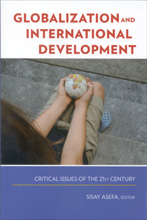Book Chapters and Essays
“Are Economists Responsible for Income Inequality?," Society, vol. 57 no. 3, 2020

"The United States and International Economic Governance" in Nicholas Kitchen (ed.), The United States After Unipolarity, London: London School of Economics, 2011.
Among the unexpected outcomes of the global financial crisis of 2008-09 has been the end of the domination of international economic governance by the U.S. and other upper income countries through the forum of the G7, and its replacement by the G20. The depth and breadth of the economic contraction required a broader response than the advanced economies alone could provide, and its origin in financial markets in the United States undermined its support for neoliberal policies. Now that the global crisis has passed, the G20 must demonstrate whether it can serve as an effective forum for monitoring and managing the global economy.
 "Globalization and Inequality Among Nations", in Sisay Asefa (ed.), Globalization and International Development: Critical Issues of the 21st Century, Kalamazoo, MI: W.E. Upjohn Institute, 2010.
"Globalization and Inequality Among Nations", in Sisay Asefa (ed.), Globalization and International Development: Critical Issues of the 21st Century, Kalamazoo, MI: W.E. Upjohn Institute, 2010.
The gap between the average income per capita levels of the poorest and the richest nations has increased during the recent eras of globalization. This paper reviews the evidence on the determinants of the disparities in per capita incomes, which has focused on the role of institutions in fostering development. Institutions primarily reflect domestic conditions, but globalization may have an impact on their development. Globalization also has direct effects on economic activity which affects the incidence of poverty, although all the channels of transmission are not fully understood. Globalization can, however, be better managed to benefit the poor.
